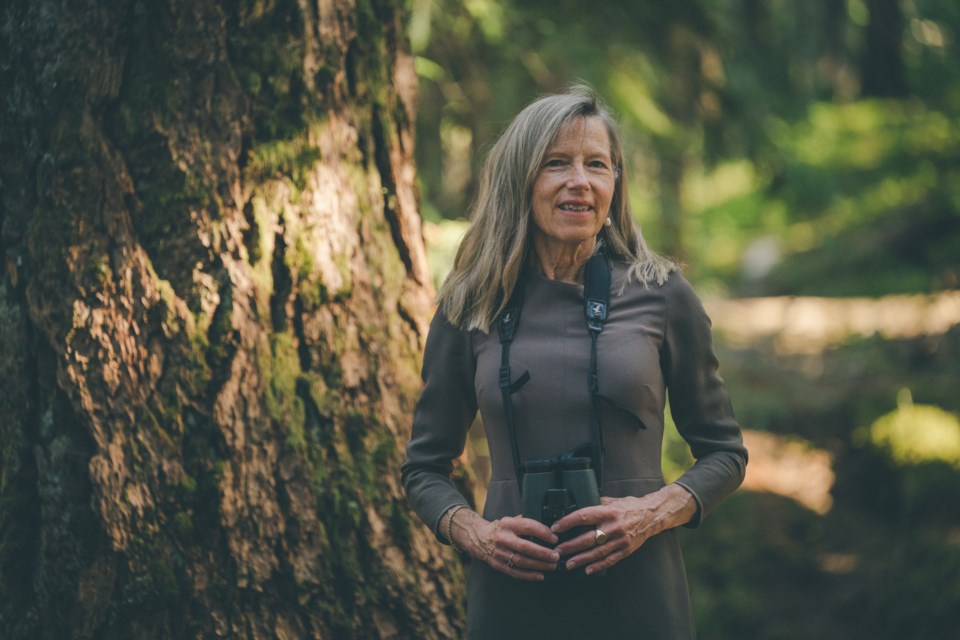Rhonda Millikin, an award-winning ecologist who has questioned Whistler’s approach to wildfire mitigation, was issued a cease-and-desist letter last month from Forest Professionals British Columbia (FPBC), which said she is not certified to offer forestry advice.
Millikin, a retired ecologist who formerly worked for Environment and Climate Change Canada, has long argued against fuel-thinning and other FireSmart practices, believing the approach isn’t effective in Whistler’s wet, coastal rainforest. She has instead advocated for rainwater catchments, sprinkler systems, and natural green fuel breaks, lobbying the Resort Municipality of Whistler (RMOW) on several occasions to rethink how it combats wildfire. Last summer, Millikin presented the findings of her self-funded, peer-reviewed research to Whistler’s mayor and council, Then, in November, she presented a petition signed by nearly 200 people calling on the municipality to carry out a pilot program testing her approach in two local neighbourhoods.
The FPBC said in its Dec. 14 letter that Millikin was unlawfully engaged in the reserved practice of professional forestry by providing advice and recommendations to the RMOW to limit or cease forest fuel-thinning efforts.
“On principle, we don’t have an issue with people, whether a member of the public or someone from a different profession, researching or holding opinions or even talking about those opinions,” explained Casey Macaulay, the FPBC’s registrar and director of act compliance, who authored the cease-and-desist letter. “Where it’s an issue is when they start to advocate for a particular practice, and in this case, where that practice is so out of sync with the current science and the current practice of protecting communities from wildfires.”
It isn’t the first such warning Millikin has received: the FPBC sent her a similar letter in August 2020. The recent cease-and-desist was issued following a complaint lodged with the FPBC, Macaulay said. The organization has also filed a formal complaint with B.C.’s College of Applied Biologists, to which Millikin belongs, concerned that her advocacy “may pose a risk or significant harm to the environment or to the health and safety of the public or a group of people.”
For her part, Millikin disagrees with the notion her work falls under the purview of professional forestry and remains confident in her research.
“I think that when we start talking about ecosystem resilience and health of the forests, that’s more ecology than forestry,” she said. “I have not sold myself as a professional forester. When we have results like this, I think it is important that we all be willing to talk about them, asking if we should be looking at alternatives. That’s really what I’m trying to get the RMOW engaged in with the treatment of our [Cheakamus] Community Forest. It’s Crown land. It’s taxpayers’ land. Why not try what I’m suggesting?”
Forest ecologist Lori Daniels, UBC Koerner Chair of Wildfire Coexistence, who has conducted extensive research across B.C. and in Whistler on wildfire mitigation, picked apart certain aspects of Millikin’s research, but said when facing a risk as significant as wildfire, there shouldn’t be a one-size-fits-all approach.
“Rhonda has some fantastic ideas. I think that they complement the kind of work that the community forest and the Resort Municipality of Whistler is doing,” said Daniels, who called Millikin a friend. “But I think that choosing one or the other, or indicating that the degree of impact from fuel treatment has such negative and severe consequences that they should not be done, is not supported by her research in the spring and summer of 2021, and I think it needs a more holistic kind of assessment.”
Daniels noted Millikin’s most recent study, which relied on several days of monitoring in the spring and summer of 2021, showed how, in the springtime, Whistler’s forest floor was drier in treated areas, but not enough to have “significant impacts” on a fire’s intensity or rate of spread. The study found no significant difference in moisture between treated and untreated understory in the peak summer fire season—“All of the surface fuels were very flammable,” Daniels said.
Even still, the UBC professor believes there is crossover between the two differing wildfire strategies, and is in favour of the pilot program Millikin has proposed for Whistler.
“I think that there's more overlap in the treatments than you know, like the green fire breaks that she's discussing—highly appropriate,” said Daniels, who explained that fuel-thinning in Whistler’s dense, second-growth forest creates the kind of leafy, green breaks Millikin is pushing for.
“I would love to see her pilot study conducted. There's lots of room in the Whistler wildland-urban interface to try alternative ways of doing things, but she'll have to do what I have done and what others have done, which is apply for the grants … in order to do the work she's proposing.”
The RMOW, while applauding Millikin’s work, even handing her a 2021 Civic Service Award for her volunteer contributions to the Forest and Wildland Advisory Committee, has stopped short of implementing her recommended wildfire strategy, citing the differing science. In response to Millikin’s advocacy, the Cheakamus Community Forest board has collected fire weather data over the past three years to better understand the variability of conditions in treated and untreated forest, Daniels said.
For now, Millikin has sought legal representation in the wake of the FPBC’s cease-and-desist. She is hopeful to continue the conversation around wildfire mitigation she helped spark at the community level.
“I’m certainly not the be-all, end-all voice on this, but we need to collaborate, and we need to be open to new ideas and information,” she said.
Anyone interested in volunteering for a potential pilot project can contact Millikin at [email protected].





